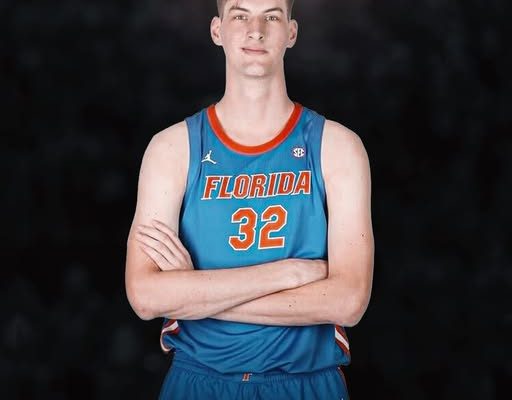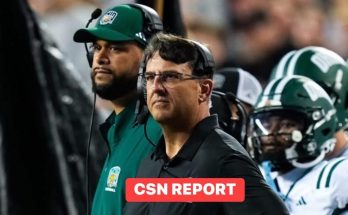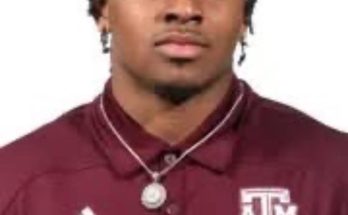Olivier Rioux has never exactly blended into a crowd, and that much was made glaringly clear once again when the Florida Gators football program decided to experiment with one of the most unusual special teams ideas in recent NCAA memory. The 7-foot-9 Canadian phenom, a certified Guinness World Record holder as the tallest teenage male on the planet, already towers above his SEC basketball peers and inspires fascination wherever he goes. But this time, it wasn’t hardwood he was walking onto — it was the gridiron, wearing helmet and pads, hoping to contribute in one of the most unexpected crossover attempts in college athletics.
While it’s common for basketball players to dabble in other sports in high school, rarely — if ever — do you see a Division I athlete with a guaranteed role on a major basketball program like Florida even entertain stepping onto a football field. Yet that’s exactly what Rioux did. The Florida football program, intrigued by his eye-popping wingspan and 7-foot-9 frame, ran a special teams workout with the towering center to see if he could become a weapon in blocking field goals and extra points. The theory made some sense on paper. At nearly eight feet tall with arms that seem to stretch into the clouds, Rioux could theoretically turn the field goal block unit into a human skyscraper.
Unfortunately, football is not played on paper.
Rioux suited up in full gear for the workout, an image that surely drew awe from everyone who witnessed it. The sight of a nearly 8-foot-tall athlete in shoulder pads and a helmet is rare enough, but seeing that player lined up in a special teams unit as an active part of the Florida Gators football program felt almost surreal. The coaching staff approached it with genuine curiosity, not just as a publicity stunt but as a real competitive idea worth vetting.
Gators head football coach Billy Napier reportedly approved the experimental session with full seriousness, encouraging his special teams staff to look for creative edges. After all, in the SEC, where razor-thin margins separate the good from the great, unconventional solutions are sometimes the difference between a win and a loss. And in a season where Florida’s special teams have come under scrutiny for inconsistency in kick blocking and coverage, exploring every possible advantage seems prudent. At least, that was the thinking.
The idea was to have Rioux stand behind the line and time his jump to coincide with the opposing team’s kick attempt. Standing flat-footed, Rioux already affects passing and shooting lanes on the basketball court without leaving his feet. Surely, the same principle could apply to blocking a kick, right?
That’s where physics, unfortunately, played a cruel joke.
Despite his astounding height, Rioux possesses a vertical leap of just 11 inches, a figure that wouldn’t cause any NBA scouts to take notice and which, on a football field, can make a huge difference when milliseconds and inches matter. On the court, Rioux makes up for his lack of leaping explosiveness with positioning, length, and sheer mass. But on special teams, where trajectory, timing, and aerial control are critical, the inability to get off the ground with speed became a glaring limitation.
When the coaches ran a series of test kicks during the workout, the results came quickly and emphatically. Rioux was able to get a hand close to a couple of kicks but couldn’t actually touch or deflect any of them. His reaction time and lack of burst prevented him from being a consistent threat. At one point, a mid-range kick soared directly over his outstretched fingers, landing easily through the uprights as if he weren’t there. From the sidelines, you could almost sense the disappointment ripple across the coaching staff.
Despite the underwhelming trial, basketball head coach Todd Golden had nothing but praise for the effort, even if it didn’t yield the desired results. “I like the idea… I give them credit for trying it,” he told reporters, perhaps masking his relief that his player wouldn’t be risking injury on the football field. That may have been the unspoken subtext for everyone involved. After all, the Gators basketball team has high hopes this season, and a 7-foot-9 presence in the post — regardless of his vertical — is still an advantage few programs can match.
Rioux himself reportedly embraced the challenge with a smile and sincere curiosity. For someone who’s been on the receiving end of endless attention due to his height since he was a child, this was just another chapter in a life of firsts. Born in Montreal, Rioux began attracting attention as early as age 10, when he was already nearing 6-foot-10. By the time he was 14, his name had reached global circles, and basketball pundits had begun debating whether his size would be a blessing or a hindrance in the modern game.
Now in college, Rioux’s journey is about redefining what someone of his size can accomplish. He’s never going to be a high-flying dunk machine or someone who switches onto guards defensively. But he sets screens like a moving wall, affects shots in the paint just by standing there, and creates mismatches just by existing. His presence forces opponents to change their game plans entirely. If the football experiment was a bust, it didn’t change the fact that Rioux is still a transformational figure in his primary sport.
Still, the whole episode sparked a wider conversation in both basketball and football circles about how cross-sport experimentation is treated at the collegiate level. In recent years, there’s been more openness to exploring unorthodox talent deployment — like rugby players becoming punters, or track athletes joining the secondary. But rarely does it involve someone like Rioux, whose sport is not just different but demands a completely different body rhythm and coordination system.
The Florida coaching staff, to their credit, approached the idea with innovation in mind, not novelty. One assistant was quoted as saying, “If he had just another six inches on his vertical, we’d probably be talking about this in a completely different tone right now.” It wasn’t a gimmick. It was a genuine trial balloon that popped the moment reality entered the equation.
Social media, predictably, had a field day with the story. Memes circulated showing Rioux with a cartoonishly large helmet or swatting down jets instead of footballs. Some fans joked that if he stood still and held his arms up, he could double as a goalpost himself. The jokes, while good-natured, also reflected how truly rare and visually shocking his frame is in a football context. One video snippet of the practice, which leaked online, showed him awkwardly shuffling into position, clearly uncomfortable in cleats and football gear. Still, the commitment to try spoke volumes about both his character and the program’s creativity.
There’s also a subtler layer to the story — the fact that Rioux even entertained the idea shows the kind of athlete and teammate he is. He wasn’t above it. He wasn’t dismissive. He took the helmet, strapped it on, and went to work, despite knowing that he was far from a natural fit for the sport. In an era where many athletes are hesitant to step outside of their curated skill sets, Rioux showed an old-school mentality: team first, curiosity second, ego last.
The episode, while ultimately unsuccessful in football terms, gave everyone involved something to take away. The Florida football program learned that height alone doesn’t equate to utility in special teams play. The basketball staff got a gentle reminder that their prized big man is more valuable where he is. And Rioux got to stretch his boundaries — literally and metaphorically — in a way that few athletes ever do. He won’t be suiting up on Saturdays at the Swamp anytime soon, but he certainly gave Gators fans something to talk about during the offseason.
What remains to be seen is whether this experiment opens the door to more cross-program collaborations at Florida. With NIL deals in play and athletes now managing their own brands as much as their stats, unusual moves like this — even if temporary — can serve multiple purposes: training flexibility, media exposure, even fan engagement. And for Rioux, who already exists as a living highlight reel due to his height, adding “attempted football player” to his resume only adds to his mythos.
In the end, some ideas don’t need to succeed to be worth exploring. Rioux’s one-day football adventure didn’t revolutionize the special teams unit or lead to blocked kicks. But it did something perhaps more valuable: it reminded people that sport is, at its core, about possibility. About the things that could work if only reality didn’t get in the way. That kind of thinking — even when it fails — is often the birthplace of progress. And in that sense, Olivier Rioux didn’t fail at all. He just helped everyone stretch the limits of what’s possible — even if only for a moment.



